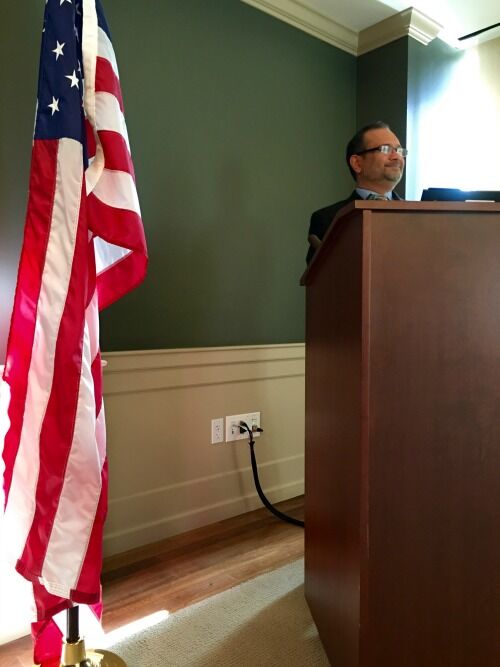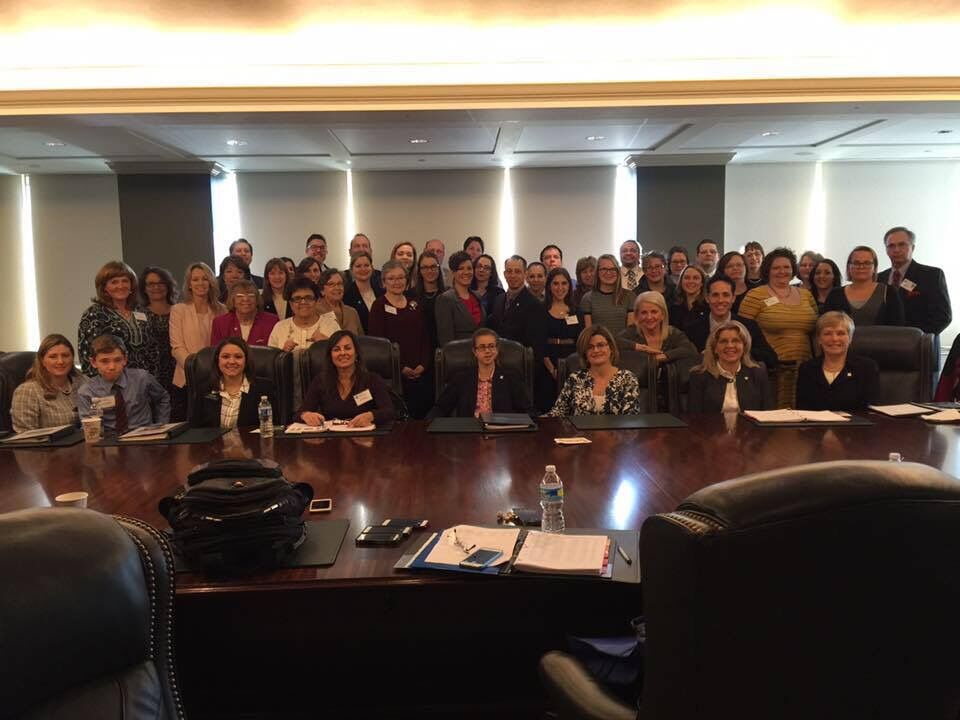On February 8, 2016, Connie Sorman, CTF Board Member, Volunteer Leadership Committee Chair and NF Mom was invited to join a group of NF families and the NF Network in Washington, DC for a day of advocacy.
The first time I was given the opportunity to advocate with the Children’s Tumor Foundation in 2014 for CDMRP (Congressionally Directed Medical Research Program) funding with my representatives on Capitol Hill in Washington, DC, I was completely intimidated and 100% sure that nobody wanted to hear what I had to say. I could not honestly even remember what CDMRP stood for and anytime I tried to explain the role of the DOD/NFRP, the NIH’s involvement or the Senate vs. House Appropriations Committees and Subcommittees…I was adrift in the bewildering sea of acronymia! You see, I was never very interested in politics nor have I been very competent at understanding political structure. Yet, I do have a story and I do have a voice and I am passionate about teaching others the importance of neurofibromatosis research. These studies can feasibly change the landscape of my son’s future and that of the many others I’ve come to know in his 18 year NF journey. And that is just how easy it is to advocate for funding on Capitol Hill.
On February 8, 2016, the day before the President’s budget was proposed; I was given this opportunity once again. The NF Network invited me, a CTF volunteer, to join their Advocacy Day in DC; to share my family’s story with our legislators. Kim Bischoff, Executive Director of NF Network, coordinated a great line-up of experts to help others, like me, to gain a better understanding of the intricacies of all things involved in NF Advocacy before we hit the Hill.
Dr. Jill Morris, Program Director, NIH/NINDS started the agenda during a Sunday evening dinner meeting. Dr. Morris shared information about how the National Institutes of Health participates in funding NF Research projects in coordination with Children’s Tumor Foundation and NFRP (The Neurofibromatosis Research Program of the Department of Defense). The three agencies comprise a pipeline of sorts which grants funding opportunities to a variety of different researchers at different stages of the research process. These research initiatives can lead to drug discoveries, higher level awards for continued study from the NIH or can go to the Clinical Trials Consortium. A successful example of one such study is the MEK inhibitor clinical trial for patients with plexiform  neurofibromas, which is showing promising early results in a number of NF patients.
neurofibromas, which is showing promising early results in a number of NF patients.
On the morning of our Hill visits, we were further enlightened by Dr. Naba Bora of NFRP (photo right). Dr. Bora explained all of the ways that NF research can offer insight into other disease areas; providing benefit to the war fighter and to the general population. Studies in the areas of bone repair, muscle weakness, pain management and wound healing are just a few examples of this important research. In addition, Dr. Bora relayed how important it was to share, within our meetings, the fact that NFRP grants do not duplicate or supplant NIH efforts, but rather enhance and complement them and that we, as constituents, support the well-run and efficient programs within the CDMRP.
The Neurofibromatosis Clinical Trials Consortium, made up of 20 clinical sites and led by the Operations Center at University of Alabama at Birmingham under the direction of CTF Board Member and Medical Advisory Committee Chair Dr. Bruce Korf, develops and performs clinical trials for the treatment of NF complications in children and adults. It is unique to have this valuable resource in a rare disease community and the Clinical Trials Consortium has proven more effective in getting research to drug discovery than other methods have, as seen by the consortium’s many accomplishments.
To a mother of a young man living with NF, this offers tremendous hope. I was compelled to share my urgent desire to continue the funding to this program and the various other research initiatives with my representatives in the Senate and in the House. I asked for support of the $18 million in funding for the Army’s NF Research Program in the fiscal year 2017 Department of Defense Appropriations bill as well as a signature on a “Dear Colleague Letter” that is being circulated by Congressmen Luis Gutierrrez (D-IL) and Reid Ribble (R-WI) in the House and by Senator Ed Markey (D-MA) in the Senate. I told them our story, showed my son’s photograph and expressed how important this is for me, their constituent. (Top photo: Connie with fellow NF Mom Lynne Black)
 There is something very powerful in knowing that you have a voice with important issues and that you can be heard. For me, NF Advocacy has become not only my right, but my responsibility as a mother and a volunteer leader with Children’s Tumor Foundation. My experience in Advocacy Day was empowering. My ability to collaborate with others from the NF community, including many different representatives or other NF organizations from across the country, gave me an even greater capacity for hope.
There is something very powerful in knowing that you have a voice with important issues and that you can be heard. For me, NF Advocacy has become not only my right, but my responsibility as a mother and a volunteer leader with Children’s Tumor Foundation. My experience in Advocacy Day was empowering. My ability to collaborate with others from the NF community, including many different representatives or other NF organizations from across the country, gave me an even greater capacity for hope.
Be heard: Share your story for future advocacy days by emailing media@ctf.org.
Ask your representatives for support by using this link to email them directly: http://www.nfnetwork.org/be-an-nf-activist/advocacy-action. Deadline is March 11 for congressmen to sign on to the Dear Colleague letter.

